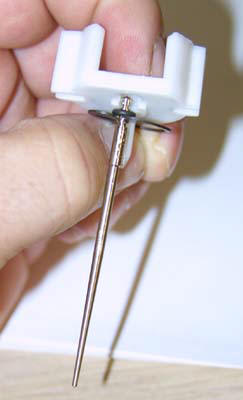Bing 54 carburator update, Bing 54 carburator needle
and clip update.
|
|
|
|
|
|
|
|
|
 |
|
|
| Bing 54 carburator needle and
clip update. |
|
Aircraft:
All ultralight aircraft using the Bing 54 carburator used on Rotax and
Hirth aircraft engines. |
|
|
Incident Report:
AAIB Bulletin No: 12/98 Ref: EW/G98/07/25 Category: 1.4
Aircraft Type and Registration:
Rans S6-ESD XL, G-MZBD
No & Type of Engines:
1 Rotax 503 piston engine
Year of Manufacture:
1996
Date & Time (UTC):
19 July 1998 at 1700 hrs
Location:
Sittles Field, Nr Lichfield, Staffordshire
Type of Flight:
Private
Persons on Board:
Crew - 1 - Passengers - 1
Injuries:
Crew - None - Passengers - None
Nature of Damage:
Significant damage to the landing gear and cockpit floor
Commander's Licence:
Private Pilot's Licence
Commander's Age:
42 years
Commander's Flying Experience:
226 hours (of which 25 were on type)
Last 90 days - 32 hours
Last 28 days - 20 hours
Information Source:
Aircraft Accident Report Form submitted by the pilot telephone
enquiries with owner, aircraft repairer and other agencies.
The pilot reported that during the final leg of a cross-country
flight,
whilst flying at approximately 1000 feet amsl, the engine RPM
decreased
from 5,800 to approximately 3,800 and the unit began to run very
roughly.
Various throttle positions were tried, none of which improved the
situation. After some 30 seconds the engine stopped completely, the
height
by then being 750 feet agl or less.
In view of this low height, no attempt was made to re-start the
engine.
The pilot judged that the only safe landing field available was
directly
beneath the aircraft and accordingly he commenced a steep right-hand
turn
through 360 degrees to position the aircraft into wind and facing up
the
local slope. Unfortunately, after straightening out the aircraft,
insufficient airspeed and height remained to enable the aircraft to
round-out into the uphill flight-path necessary for a landing. The
aircraft stalled whilst about 10 feet agl.
Examination of the engine subsequently revealed that a needle in the
jet
of one of the carburettors had detached and fallen into the jet area.
It
detached as a result of breaking in the plane of the locating groove
after
severe machining type wear had been inflicted as a result of
continuing
rotation of the needle relative to its mounting circlip. This problem
has
been encountered in the past; it occurs under certain conditions of
vibration and resonance. It led to the fatal accident of the similarly
powered Colb Twin-Star, G-MWWF, in 1994, see AAIB Bulletin 11/94. As a
result of that accident, the AAIB made the following comments and
recommendation to the CAA:-
"The cause of the partial engine failure was that the needle on
the rear
carburettor had worn through at the circlip and had dropped into the
carburettor jet, restricting the flow of fuel to the rear cylinder.
The
needle was retained in position by a circlip which was spilt at the
apex
of the hole holding the needle; the edges of the split had 'machined'
away
the groove in the needle as it rotated under the forces generated by
vibration. This problem is well known and both the UK distributor and
the
manufacturer (Rotax) have issued safety bulletins calling for a 50
hour
inspection of the needle and an ultimate life of 150 hours.
Rotax are developing a modification for new production which will
introduce an 'O' ring to each side of the circlip to prevent the
needle
rotating. The modification is due on the production line at the end of
the
year. It is therefore recommended that:-
94-35 The CAA require that the modification to the carburettor needle
fixture on Rotax engines be made retrospective and mandatory, and that
in
the meantime the 50 hour check be also made mandatory."
The CAA did not accept this recommendation. Their reasons were stated
in
their document 'Follow-Up Action On Occurrence Report ' No F30/94.
The modification ultimately engineered by the manufacturer is slightly
different from that described above. It has now been available (at
minimal
cost) for retrospective installation for approximately 18 months. It
is
installed on current production engines, although the fact that
suppliers
and builders of kits frequently store engines for extensive periods
results in new aircraft continuing to come into use with engines which
may
have been built before the modification became part of the production
standard.
The aircraft involved in this accident is understood to have completed
49
hours total flying at the time of the accident.
|
UPDATE
This update prevents wear on the
needle and clip. The update requires the purchase of part #831-715 a rubber 0 ring which
fits on to the top of the needle, and the installation of a NEW style retaining cup part #
827-347. The new retaining cup has a cut out for the rubber O ring which puts pressure
down on the clip and needle to prevent them from turning and wearing.
| New style retaining cup part # 827 347 - $15.95
|
|
| New O ring which can be installed
on older style needles
part # 950 430 - $3.95 |
|
| New style clip part # 963 500 - $8.75
|
|
| |
|
|
|
|

Updated needle, clip, O ring and cup |

This is the new style of clip which can be used
with the new rubber 0 ring and retaining cup.
Click here for a quick way to
check your needle and clip!
Click here for Rotax update in pdf format
|
|
|
|
|
|
|
|
|
|
Ultralight Aircraft News.ca Web Magazine EMAIL for l Information.
No part of this
publication may be copied or distributed, transmitted, transcribed,
stored in a retrieval system, or translated into any human or computer
language, in any form or by any means, electronic, mechanical,
manual, or otherwise, without written permission of Ultralight Aircraft News.
By copying or paraphrasing the intellectual
property on this site, you're automatically signing a binding contract
and agreeing to be billed $10,000 payable immediately. Copyright Ultralight Aircraft News.ca
|



